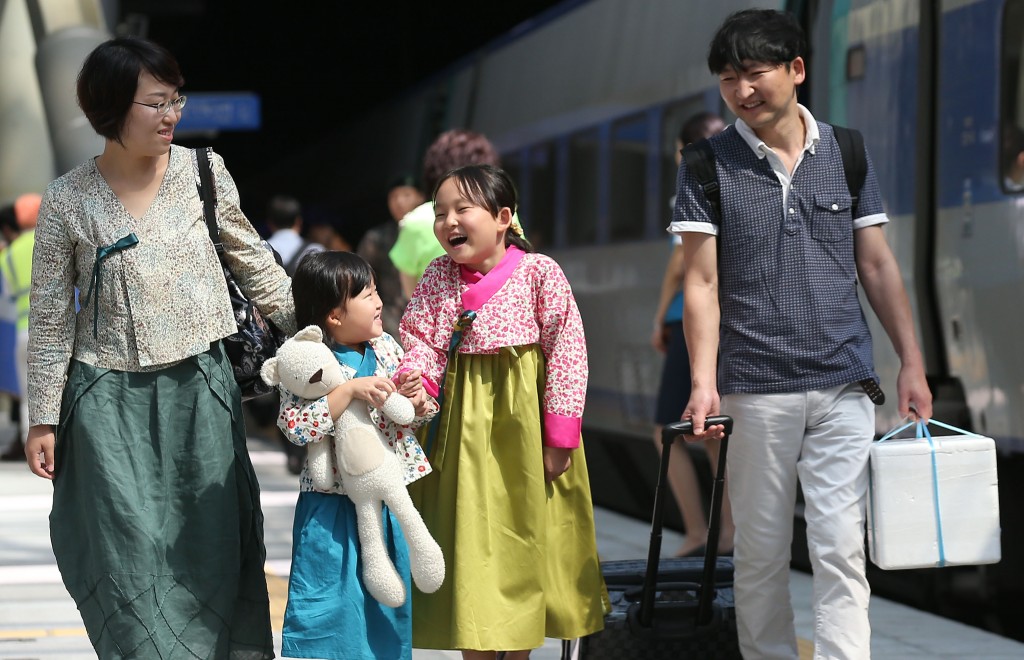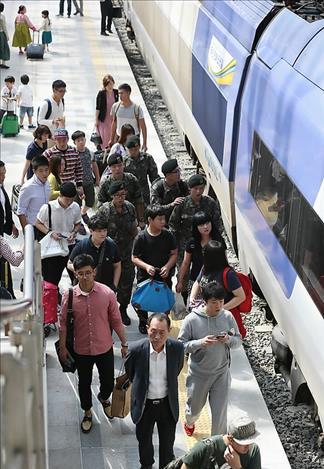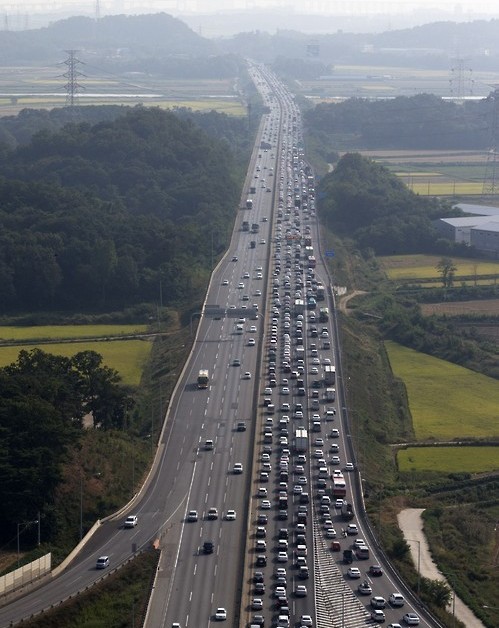- California Assembly OKs highest minimum wage in nation
- S. Korea unveils first graphic cigarette warnings
- US joins with South Korea, Japan in bid to deter North Korea
- LPGA golfer Chun In-gee finally back in action
- S. Korea won’t be top seed in final World Cup qualification round
- US men’s soccer misses 2nd straight Olympics
- US back on track in qualifying with 4-0 win over Guatemala
- High-intensity workout injuries spawn cottage industry
- CDC expands range of Zika mosquitoes into parts of Northeast
- Who knew? ‘The Walking Dead’ is helping families connect
Millions of S. Koreans hit the road for Chuseok

Along with Lunar New Year, Chuseok marks South Korea’s longest holiday in which many South Koreans head to their hometowns for ancestral rituals and to spend time with their families. (Yonhap)

According to the Ministry of Land, Infrastructure and Transport, nearly 32 million people are expected to travel around the country.
By Jung Min-ho
Millions of South Koreans hit the road Friday to gather with their families in their hometowns for the nation’s most celebrated holiday — Chuseok.
According to the Ministry of Land, Infrastructure and Transport, nearly 32 million people are expected to travel around the country, causing bumper-to-bumper traffic on expressways and roads nationwide through Tuesday.
Expressways and railway stations were packed with cars and people at the start of the traditional pilgrimage for family reunions and leisure.
The number of travelers is predicted to peak on Saturday. On average, 6.4 million people are expected to travel each day during the period, up from 5.88 million last year.
With eight out of 10 travelers planning to drive, around 4.5 million vehicles per day are expected to be on the roads. For the 400-kilometer drive from Seoul to Busan, the ministry estimated that it will take about seven-and-a-half hours, two hours longer than last year.
The ministry and provincial governments have increased the number of buses, trains, flights and ferries to reduce traffic congestion during the holiday period.
Information on less-congested roads and other traffic situations is available on the ministry’s website (cyber.mltm.go.kr/traffic) and its mobile application (m.mltm.go.kr/traffic).

In this aerial photo, bumper-to-bumper traffic in Pyeongtaek, south of Seoul, clogs one side of a highway linking Seoul to the southwestern port city of Mokpo on Sept. 25, 2015, as South Korea’s annual exodus for the Chuseok fall holiday begins. Chuseok, which falls on Sept. 27 this year, is the season for family reunions, with Koreans traditionally offering a ritual feast to their ancestors on Aug. 15 of the lunar calendar.(Yonhap)
Ahead of the four-day holiday, police as well as the state-run Korea Transportation Safety Authority have been actively promoting “seat belts for backseat passengers.”
Since 2011, a new law has required everyone in a car to wear seat belts, but few people know about it. Violators could face a 30,000 won ($25) fine.
Thousands of clinics, hospitals and pharmacies will be open each day around the country.
The authorities will also operate a 24-hour emergency medical information center ― those calling 1339 can find information on hospitals and pharmacies on duty in their town. English, Chinese and Japanese speakers can also use the service.
As the weather will be fine during the holiday, people will be able to see the full moon across the country, according the Korean Meteorological Administration.
Meanwhile, more than 700,000 people will take overseas trips, Incheon International Airport Corp. (IAC) said. The number is the largest since Incheon International Airport began operations in 2001.
The IAC said it will increase the operating hours of airport buses and trains during the holiday period.
The Seoul Metropolitan Government said that it will extend the operating hours of buses and subways to 2 a.m. from the current 1 a.m. on Sunday and Monday.
















Pingback: Here comes Chuseok (Korean Thanksgiving)… | Korean Culture Blog
Pingback: Car Rental Seoul Incheon Airport | reviewing - car rental companies